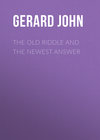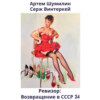Читать книгу: «The Old Riddle and the Newest Answer», страница 2
VI
"THE LAW OF SUBSTANCE"
WE have just been told by Professor Haeckel, that the means and methods which he has chosen for the establishment of his philosophy are, on the whole, identical with those employed in all purely scientific investigation, namely, first experience, and secondly inference.
But here a grave difficulty at once presents itself. How, either by experience or by inference, can we learn anything about the commencements of the universe, as to which we have heard so much? How the first bodies, whether organic or inorganic, actually arose, neither philosophy nor science can definitely say, for the latter was not there to see, and the former has no facts on which to argue.30 But if neither by observation, nor by clear inference, can the account that has been given be substantiated, that account cannot pretend to be scientific, for it rests not upon knowledge but upon speculation, – and as Professor Tait warns us,31 "That of which there is no knowledge is not yet part of Science."
This plain consideration seems to account for a fact which is undoubtedly highly significant. Professor Huxley had certainly no prejudices against evolutionary systems, could they but be satisfactorily established. He knew all that Professor Haeckel has urged on behalf of his own theory, and showed how much he was in sympathy with it by naming after his friend the ill-starred Bathybius Haeckelii, the deep-sea slime which was at first supposed to bridge the gulf between the organic and the inorganic worlds, and to be living stuff in process of spontaneous manufacture. Nothing, in fact, as he himself admitted, in his controversy with Dr. Bastian, could have suited him better than a demonstration that Nature possesses all the powers necessary for her own processes, and that the explanation of all is within the scope of Science. But, at the same time, he reverenced scientific truth beyond anything else, and he was keenly sensible of the danger attending the use of hypothetical explanations, leading to conclusions which cannot be experimentally tested, which danger he carefully shunned.32 Accordingly, not only did he never lend his countenance to what Professor Haeckel represents as the inevitable conclusions of Science, but he even plainly intimated that those who advanced such views were going much farther than Science warrants. The doctrine of Evolution, he declared,33 is not only attacked on false grounds by its enemies, but is made by some of its friends to cover so much which is disputable, as to force him in self-defence to make his own position clear in its regard. And the first point of his explanation is to repudiate the idea that we have any such knowledge as Professor Haeckel assumes. "I have nothing to say," he writes, "to any 'Philosophy of Evolution.'"
Being thus necessarily destitute of support either directly from observation or by inference from observed facts, it would seem that only in one way can Professor Haeckel's system of cosmogony, or world-production, obtain any support from Science. If amongst the operations now in progress in the universe, is to be found evidence of an exhaustless and self-renewing energy, a mainspring capable of keeping the machine going everlastingly, then undoubtedly there will be an explanation forthcoming, which, whatever difficulties may still remain on other grounds, will at least furnish a complete mechanical account of things within the ken of Science. May we not suppose that this is what is claimed as being supplied by the "Law of Substance," which is represented as the cornerstone of the whole edifice, the supreme triumph of scientific discovery, and, in fine, "the universal law of evolution"? Let us see how far such a notion can be styled scientific.
As has been shown, a "Law" is nothing but a statement that a certain kind of fact is found to occur in certain circumstances. Professor Haeckel has told us that the "Law of Substance" is a blend of two such statements, namely, "the Law of the persistency or indestructibility of matter," which signifies that in no instance within our knowledge is any particle of matter destroyed, and "the Law of the persistence of force, or conservation of energy," which signifies that the sum of force, at work in the world, and producing all phenomena, is similarly found to be unalterable.34
It must here first be observed that the term "Conservation of Energy," is more correct and intelligible than "Conservation of Force"; by "Energy" being understood the power of doing "work," that is to say, of overcoming resistance.35
It is in this form alone that Force becomes subject to observation and can be measured by Science, and the Law of Conservation which observation reveals is thus stated: The sum of all the various energies in the universe is a constant quantity, which can be neither increased nor diminished, though it may be changed from one form to another;36 such forms being motion, heat, chemical action, electricity, magnetism.
But another point is of far greater importance. The mode in which Professor Haeckel states this fundamental Law is altogether deceptive. He tells his readers only half the truth, and when the other half is told, not only is his whole doctrine found to receive no support from the Laws of Energy, but it is these very Laws which appear most incompatible with it.
For, along with the Law of the Conservation, there is another, of the Dissipation of Energy. It is perfectly true, as Professor Haeckel often repeats, that the sum of Energy existing in the universe remains ever the same: but it is no less certain, as he unfortunately fails to remind his readers, that the stock of Energy available for the work of the universe is growing less every day. Though none is ever destroyed, much is constantly lost, being dissipated, or radiated into space, in the form of heat which can never be recaptured or translated into any form which can be of any practical avail. "It is lost for ever as far as we are concerned."37
From what we have heard concerning the Law of Substance it might naturally be supposed that it certified us of the continued existence of the power required to carry on the operations of Nature, and that, accordingly, reason bids us to suppose these operations to be everlasting. But this neglected element of the reckoning, or Entropy as it is styled, leads scientific men to an entirely different estimate. Thus Professor Balfour Stewart writes:38
Although, therefore, in a strictly mechanical sense, there is a conservation of energy, yet, as regards usefulness or fitness for living beings, the energy of the universe is in process of deterioration. Universally diffused heat forms what we may call the great waste-heap of the universe, and this is growing larger year by year.
We have [he continues] regarded the universe, not as a collection of matter, but rather as an energetic agent – in fact, as a lamp. Now it has been well pointed out by Thomson,39 that looked at in this light, the universe is a system that had a beginning and must have an end; for a process of degradation cannot be eternal. If we could view the universe as a candle not lit, then it is perhaps conceivable to regard it as having been always in existence; but if we regard it rather as a candle that has been lit, we become absolutely certain that it cannot have been burning from eternity, and that a time will come when it will cease to burn. We are led to look to a beginning in which the particles of matter were in a diffuse chaotic state, but endowed with the power of gravitation, and we are led to look to an end in which the whole universe will be one equally heated inert mass, from which everything like life or motion or beauty will have utterly gone away.
It is doubtless true that attempts have been made to show that this conclusion is not final, and that there may be resources whereby Nature is able to recoup herself, and to draw upon some bank unknown to us for her missing store. As we have seen, Professor Haeckel simply takes for granted that some such means of recuperation exist and operate, and he is not wholly without countenance from others. Thus, no less an authority than Sir William Crookes addressing the Chemical Society as its president, thus expressed himself:40
If we may hazard any conjectures … we may I think premise that the heat radiations propagated outwards, … by some process of nature unknown to us, are transformed at the confines of the universe into the primary – the essential – motion of chemical atoms, which the instant they are formed, gravitate inwards, and thus restore to the universe the energy which would be lost to it through radiant heat. Hence Sir William Thomson's startling prediction falls to the ground.
But it need not be pointed out that if an advocate so eminent as Sir William Crookes is reduced to pleas like this on its behalf, the case for Renovation of Energy must be singularly destitute of anything resembling scientific support. Suppositions which are avowedly hazarded as conjectures, and which must appeal to processes of Nature of which we know nothing, whatever authorship they may boast, have nothing to do with Science, and possess no sort of value for our purpose.41 It must of course be allowed that we may still be utterly in the dark as to the whole of this question, and that further discoveries may one day completely upset all our present notions. But we are concerned with the evidence which Science has now before her, and with the assertion so confidently advanced that this makes the Law of ceaseless Evolution an indisputable truth. We find, on the contrary, that this Law runs directly counter to the facts as they are at present known to us, and to the conclusions drawn from them by the most authoritative representatives of science.
Nor is it only our own globe and solar system that appear to be thus bound towards an inevitable doom. The eternal rhythm of life and death, of which we have been told as pervading the endless depths of space, has no better title to scientific sanction. Like the minor province which we inhabit, the whole universe, we are assured, – so far as we have means of calculating, – must ultimately arrive at a condition of eternal stagnation, – its component parts being drawn close together by their mutual attractions, – so that motion ceases; while the heat replacing it being equally diffused, becomes as incapable of doing work as water between two pools on the same level is of turning a mill. As the writer lately quoted sums up the matter:42
Slow as the process of condensation is, it is not endless. In time all the meteoric dust will be collected into stars or planets; and in time the law of dissipation of energy will bring all these bodies to a uniform temperature. So at last the movements due to the original unequal distribution of matter will cease, and the life of the universe will come to an end. We know of no process of rejuvenescence, by means of which dissipation of energy and the force of gravitation might be counteracted. Several attempts have been made to refute the theory of the dissipation of energy, but all have failed.
This, however, is but the first of many difficulties which must be disposed of ere the account of the world's genesis which we are considering can pretend to our acceptance on the ground that reason and science proclaim its truth.
VII
"THE SEVEN ENIGMAS"
THE doctrine that the universe is an automatic machine, – self-originated and self-sustained – undoubtedly rests upon a principle formally recognized by some evolutionists, as the "Law of Continuity," and taken for granted by many who do not put it into words. This principle is, – that everything must always have happened according to the same laws of Nature which operate now; that there can never have been a "miracle," understanding by this term whatever is beyond the scope of natural forces; and that, accordingly, the whole of the world's history, – one stage as much as another, – falls within the province of Science. By no one has this position been more clearly stated than by the late Professor Romanes.
All minds [he tells us]43 with any instincts of science in their composition have grown to distrust, on merely antecedent grounds, any explanation which embodies a miraculous element. Such minds have grown to regard all these explanations as mere expressions of our own ignorance of natural causation; or, in other words, they have come to regard it as an à priori truth that nature is always uniform in respect of method or causation; that the reign of law is universal; the principle of continuity ubiquitous.
He goes on to declare that "The fact of evolution – or, which is the same thing, the fact of continuity in natural causation – has now been undoubtedly proved in many departments of nature," and that, in particular, "throughout the range of inorganic nature" it is "a demonstrated fact."
If this be so, it must necessarily follow that the Laws of Nature, as Science finds them operating, sufficiently explain not only all that happens in our present world, but also all that must have happened while this world was being produced. According to what has already been said, by "The Law of Continuity" no more can be signified than that Continuity is a fact, that the world has actually come to be what it is through the continual operation of just the same natural forces as we find at work to-day. That things did so happen we have not and cannot have, direct evidence; for no witness was there to report. We can but draw inferences from the present to the past, and argue that what Nature does to-day, she must have been capable of doing yesterday and the day before. Only thus can continuity of natural laws possibly be established. It would obviously be vain to argue that we must suppose no other forces ever to have acted than those we can observe, because, for all we know, other conditions may so have altered as to make their results altogether different from any of which we have experience.
It is likewise manifest that if we are to speak of demonstrated facts, and of conclusions placed beyond rational possibility of doubt, proofs must be forthcoming sufficient to compel scientific assent.
And here lies the difficulty. Very much must unquestionably have happened in the course of the world's making for which the Laws of Nature as we find them now acting cannot account, and which, therefore, Science cannot attempt to explain. So we are assured by eminent scientific men, – men, too, who desire nothing more than to find an explanation, but are driven, in search of one, as we have already seen Sir W. Crookes, to plead the limitation of our knowledge, and that there may be capabilities in Nature of which we are ignorant. But it remains always true, that what we do not know is not yet part of Science, and that if our scientific information, so far as it goes, is adverse to the Law of Continuity, it is quite unscientific to bring arguments for the law not from our knowledge, but from our lack of it. Still more unscientific is it to proclaim that Science has pronounced judgment in a sense contrary to that of all the evidence hitherto presented to her.
Amongst the men of Science who testify as above, we may begin with Herr Du Bois-Reymond, an avowed Evolutionist and Materialist, whom Professor Haeckel styles, "the all-powerful secretary and dictator of the Berlin Academy of Sciences."44 He can be suspected of no prejudices which would prevent him from accepting Professor Haeckel's cosmogony, if only he found the evidence satisfactory. Far from this, however, he declares,45 that the history of the universe confronts us with no less than seven problems, for which Science has no solution to offer, and some of which he holds to be for ever insoluble. These he styles "Enigmas," and they are:
(1) The nature of Matter and of Force.
(2) The origin of Motion.
(3) The origin of Life.
(4) The apparently designed order of Nature.
(5) The origin of sensation and consciousness.
(6) The origin of rational thought and speech.
(7) Free-will.
The first, second, and fifth of these are in the opinion of Du Bois-Reymond "transcendental," or beyond possibility of solution. The others, in his judgment, have certainly not yet been solved, but perhaps may be solved some day. As to the last, he much doubts whether it should not also be classed as "transcendental."
It thus appears that in the judgment of a competent witness, and one no-wise biassed by preconception or prejudice, so far from it being true that Professor Haeckel's story of the universe is imperiously imposed on us by the results of Science, not one but several great gulfs in the course of that history must have been bridged over somehow, which Science confesses she cannot bridge, so far as her present knowledge goes, that is to say, so far as she is Science at all.
Professor Haeckel, it is true, loudly pronounces Du Bois-Reymond's declaration to be mere "dogmatism"46 of a "shallow and illogical character," and he undertakes to show that with the help of his own philosophy the enigmas cease to be enigmatical.
In my opinion [he writes] the three transcendental problems (1, 2 and 5) are settled by our conception of substance; the three which he [Du Bois-Reymond] considers difficult, though soluble47 (3, 4 and 6) are decisively answered by our modern theory of evolution; the seventh and last, the freedom of the will, is not an object for critical scientific inquiry at all, for it is a pure dogma, based on an illusion, and has no real existence.
How far such a mode of rebuking dogmatism appears convincing, must of course depend on what the reader understands by an argument. Some points already considered may help us to a right estimate of proofs which are based upon "Our conception of substance," or "Our modern theory of evolution," and we shall presently inspect more closely the nature of the difficulties which we are invited so summarily to dismiss. Meanwhile, even though not final or conclusive, the testimony of such a man as Du Bois-Reymond serves at least to prove that it is possible to be thoroughly familiar with Science and her teaching, and yet to believe that as yet she knows nothing at all concerning questions which, as we have been assured, she has conclusively answered. And, as we shall presently see, if Professor Haeckel's account of things be the true one, there are many more scientific men of the first rank who are equally in the dark.
In a word, while according to Professor Haeckel there is in the universe but one Riddle, which he tells us he has solved, – in the opinion of another who is certainly no less entitled to speak in the name of Science, there yet remain seven to which no answer has yet been given, and to three, at least, of which none will ever be found.
VIII
MATTER AND MOTION
IN the forefront of the problems which have been pronounced to be not only unsolved but insoluble, are the nature and origin of the ultimate factors arrived at by Science in her study of the constitution of the universe, – Matter, Force, and Motion.
With the first and last of these alone need we at present concern ourselves, for "Force," as Science knows it, is always associated with Matter, and signifies no more in her terminology than that which produces, or tends to produce Motion. On the other hand, we are told,48 that "The contents of the material universe may be expressed in terms of Matter and Motion."
By "Matter" is understood "Sensible Substance," the stuff composing all of which our senses tell us, and which forms the object of Scientific investigation. What do we know concerning this raw material whereof worlds are made?
As we have seen, Professor Haeckel and his school are ready to tell us. Matter, we are assured,49 is self-existent and imperishable, "it has no beginning and no end; it is eternity." Together with Ether, it occupies infinite and boundless space. It is in ceaseless motion; and its interminable modifications produce everything that ever was or ever will be. Movement50 is one of the "innate and original properties" of Matter. So are Sensation and Will,51 but these, we are warned,52 are "unconscious."
Obviously, however, it is not enough that these things should be said, they require likewise to be proved; and the question must immediately suggest itself, Whence is proof to come? Not, by any possibility, from observation and experiment. For who can speak, of his own knowledge, to eternity or infinity? The only conceivable supposition is that Science has so thoroughly mastered the nature and properties of Matter here and now, as to be furnished with evidence unmistakably pointing to the above conclusions. Thus alone can she be quoted on their behalf; and it must always be remembered that the philosophy which we are examining is nothing if not scientific.
But, in the first place, is it quite clear of what our philosophers are speaking? They use the term "Matter" as though it represented some one definite thing: but this is very far from being the case.
We must remember [says Lord Grimthorpe]53 that matter is not an unit, as a creator is, and that talking of it so is merely a rhetorical artifice when used in philosophical inquiries… Matter is nothing but the sum of all the ultimate particles or atoms contained in the universe, or in any particular mass that we are dealing with… A very large proportion of the atoms of the universe have never been within millions and billions of miles of each other.
Therefore, he goes on to urge, the doctrine of the self-existence of Matter, must mean that each several atom is self-existent, or "every atom its own god." How comes it then that they all obey the same "Laws"? How have their various provinces been allotted? Above all, how are they not all the same, but – so far as we know – divided into classes widely different from one another? For, according to our present knowledge, – and we cannot too frequently remind ourselves that upon this alone can any sound conclusion be based, – there are, in round numbers, some seventy different species of atoms, whose diverse qualities are absolutely necessary for the production of the world. Had all atoms been of one kind, we could have had none even of what used to be called the Four Elements, – neither Earth, Air, Fire, nor Water.
But, – apart from this, – What is known concerning this same "Matter"? Has Science so thoroughly fathomed its constitution as to be able to declare that it possesses all the properties we have heard assigned to it, – Sensation and Will, even of the unconscious kind, whatever that may be, – locomotive power, – eternity, – and, in its collective capacity, immensity?
So far from this being the case, scientific men who were most willing, and even anxious, to assign to Matter a foremost, if not the foremost, place in Nature, have done so precisely upon the ground, not of our knowledge, but of our ignorance. No better examples need be sought than Professor Huxley, and Professor Tyndall, who alike agreed, in the words of the latter,54 "to discern in Matter the promise and potency of every form and quality of life." But Huxley took his stand on the declaration, that we know so little about Matter as to make it impossible to say of what it may not be capable, for we cannot so much as be certain of its existence, and use the term only "for the unknown and hypothetical causes of our own states of consciousness,"55 while Tyndall described the process, whereby the promise and potency are realized, as "the manifestation of a Power absolutely inscrutable to the intellect of man."
Speculations thus founded upon the absence of evidence, whatever else they may be, are certainly no part of Science; and when we turn to what, being established by scientific methods, is a possible basis of scientific argument, we find that in every instance it contradicts instead of supporting the assertions we have heard.
To begin with the question of Motion, as being both of supreme importance, and one more open than some others to observation and experiment. According to Professor Haeckel's teaching, "movement is an innate and original property of substance," that is to say of Matter, and in consequence, "Substance is everywhere and always in uninterrupted movement and transformation." It is by thus attributing to matter an inherent determination to move that he meets Du Bois-Reymond's difficulty as to the origin of motion.
But this is in direct opposition to the first of Newton's Laws, which are universally recognized as the most firmly established and unquestionable of all scientific conclusions. This law tells us that a body at rest will continue at rest for ever, unless compelled by some force to move; just as a body in motion will continue to move at the same rate and in the same direction, unless compelled by force to arrest or alter its course. Upon the universal certainty of this law the whole of our Natural Philosophy depends: but it absolutely blocks the way for the idea that Matter has an innate tendency to move itself, which is thus quite unscientific. Not self-movement but Inertia is the property which Science ascribes to Matter.56 It may further be observed that the idea of inherent motion is absurd and unintelligible; for movement cannot be in more than one direction at a time: so that a mass, or an atom, of Matter could tend to move only by having an intrinsic impulse in a straight line towards some one particular point. If it should tend to move indifferently, in all directions at once, it would remain motionless, each such tendency being neutralized by its opposite.
As to the further claim made on behalf of Matter to be endowed with Sensation and Will, of any description, it must be enough to say that no one has ever pretended to find any evidence whatever to this effect, or to detect the faintest trace of such properties; – and that on the contrary, all experience shows inorganic Matter, (that is, Matter not incorporated in living animals or plants,) to be utterly lifeless and inert. It is a mere abuse and perversion of terms to speak of Science as countenancing any conclusion but that to which such experience points. The attempt to invest Matter with these attributes Professor Tait stigmatizes as "non-science," or "pseudo-science."57
The Pygmalions of modern days [he writes] do not require to beseech Aphrodité to animate the ivory for them. Like the savage with his Totem, they have themselves already attributed life to it… The latest phase of this peculiar non-science tells us that all Matter is alive; or at least that it contains "the promise and potency" (whatever these may be) "of all terrestrial life." … So much for the attempts to introduce into Science an element altogether incompatible with the fundamental conditions of its existence.
In fine, to make us realize not merely how extremely narrow are the bounds of our knowledge, but even how much narrower they may be than we suppose, there enters upon the scene Radium, like the golden apple that came to disturb the harmony of the celestials. What lessons this turbulent and unconventional element will ultimately be found to teach, and how far it will revolutionize the laws of Nature as hitherto accepted, remains, of course, to be seen: but this at least is clear. In presence of it, scientific men find that they are sure of nothing they thought most certain, not of the indestructibility of matter itself, on which is based that Law of Substance which we have seen made responsible for so much.
It had been thought that whatever else might change or perish the atoms of which we have heard, as the ultimate constituents of Matter, were beyond the reach of any vicissitude. "No man," said Dalton, their discoverer, "can split an atom." Thus too Mr. Clodd, while acknowledging that the constitution even of atoms may some day be found to be liable to disorder and decay, clearly teaches that, as a practical certainty, we have in them got to something final. Taking one particular kind, an oxygen atom, as a text, he thus discourses:58
It matters not into how many myriad substances – animal, plant, or mineral – an atom of oxygen may have entered, nor what isolation it has undergone: bond or free, it retains its own qualities. It matters not how many millions of years have elapsed during these changes, age cannot wither or weaken it; amidst all the fierce play of the mighty agencies to which it has been subjected it remains unbroken and unworn; to it we may apply the ancient words, "the things which are not seen are eternal."
But now, with the recognition of radio-activity, and the disintegration of atoms into their constituent "electrons" which this is held to evidence, we have changed all that. Such disintegration, it is affirmed, must imply dissolution and death, alike of the atoms themselves and of the universe which they compose. As Sir William Crookes told the physicists assembled at Berlin, June, 1903:
This fatal quality of atomic dissociation appears to be universal, and operates whenever we brush a piece of glass with silk; it works in the sunshine and raindrops, in lightnings and flame; it prevails in the waterfall and the stormy sea.
Matter he consequently regards as doomed to destruction.59 Sooner or later, it will have dissolved into the "formless mist" of "prothyle"60 and "the hour-hand of eternity will have completed one revolution."
Consequently, we are told,61
The "dissipation of energy" has found its correlative in the "dissolution of matter." We are confronted with an appalling sense of desolation – of quasi-annihilation.
It is no doubt true, here again, that such judgments cannot be called final, and that not all scientific men will accept them as they stand. But all alike are forced to agree that our previous notions are completely upset, and that we are compelled to recognize the fact that of these fundamental questions we know far less than the little we seemed to know. What, then, is to be thought of Professor Haeckel's confident utterances, which could be justified only on the supposition that we know everything? And what becomes of the famous Law of Substance, if both its parts are found thus to contradict the conclusion he would draw from it?
… Tait writes in lucid symbols clear one small equation;
And Force becomes of Energy a mere space-variation.































